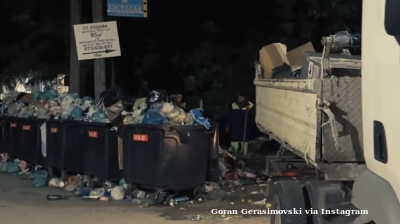North Macedonia’s Prime Minister Hristijan Mickoski said on September 2 that the country is facing “a new scandal” involving illegal wiretapping and massive abuse of the surveillance system in recent years.
The investigation was reported ahead of North Macedonia’s local elections on October 19. For Macedonians, it recalls the wiretapping scandal of 2015 that shook the country’s democratic institutions, sparking the Colourful Revolution.
Acting on the instructions of state public prosecutor Ljupco Kocevski, the Basic Public Prosecutor's Office for the Prosecution of Organized Crime and Corruption has opened a case to investigate allegations of surveillance targeting Mickoski.
“I personally, then as opposition leader and today as prime minister, together with journalists, media, businessmen and public figures, have been victims of the system that monitored its citizens. This is not an attack only on me, but on democracy,” Mickoski said, pledging that there will be “no selective justice” and that those responsible will face legal consequences.
He added that the government’s “partnership for open government” is intended to ensure accountability and transparency, saying “where there is light, there is no room for shadows”, according to the government statement.
The largest opposition party, the SDSM, accused Mickoski’s government of manipulation and demanded the immediate declassification of all documents related to the case handled by the National Security Agency (ANB).
SDSM spokesperson Bogdanka Kuzeska cited “contradictory statements” by Mickoski and ANB director Zoran Hristovski, who said the case concerns information gathering on targeted individuals, not illegal wiretapping. “Who is lying here?” Kuzeska asked, warning that unless all documents are made public, the case could prove to be “another failed attempt at manipulation by the government and pre-election abuse.”
The SDSM accused Mickoski’s VMRO-DPMNE of playing with the security apparatus for political purposes, comparing the affair to earlier controversies that the party described as fabrications.
VMRO-DPMNE parliamentary group coordinator Nikola Micevski said unauthorised monitoring of political opponents, journalists and businesspeople is a “serious blow to democracy and trust in institutions.”
He called on the prosecution to launch a full investigation, arguing that misuse of surveillance powers undermines the rule of law and could set “a dangerous precedent.”
The latest claims have revived memories of North Macedonia’s most notorious political scandal in 2015, when then-opposition leader Zoran Zaev from SDSM revealed that the VMRO-DPMNE government of former prime minister Nikola Gruevski had illegally wiretapped more than 20,000 people. Those allegedly monitored included opposition politicians, journalists, activists, judges and diplomats.
The revelations triggered months of mass street protests, known as the Colourful Revolution, during which demonstrators threw paint at government buildings and monuments to symbolise their opposition to corruption and authoritarianism. The scandal also drew heavy criticism from the EU and the US, eventually leading to Gruevski’s resignation in 2016 and early elections.
Zaev later came to power in 2017, campaigning on a promise to restore democracy and strengthen the independence of institutions.
Gruevski was later convicted of corruption charges, but in 2018 fled the country and was granted asylum in Hungary, where he remains in Budapest.
News

Rheinmetall invests €400mn in propellant powders joint venture in Romania
Partnership is part of Bucharest’s effort to attract defence investment and expand its domestic industrial capacity.

Hungary, US set to deepen nuclear energy ties during Orbán’s White House visit
Viktor Orban, seeking to secure a temporary waiver from US sanctions on Russian oil, will propose a pragmatic energy deal to Washington, offering deeper cooperation in the LNG and nuclear sectors.

EU’s Kallas warns Bosnia’s EU accession window could close if reforms stall
EU officials have repeatedly said that the bloc’s door remains open to Bosnia, but internal political divisions and delayed reforms have slowed progress toward membership.

Serbia moves to fast-track controversial Trump hotel project
$500mn luxury hotel and residential complex to be built on the site of the former Yugoslav defence ministry in central Belgrade, destroyed during the 1999 Nato bombardment.




